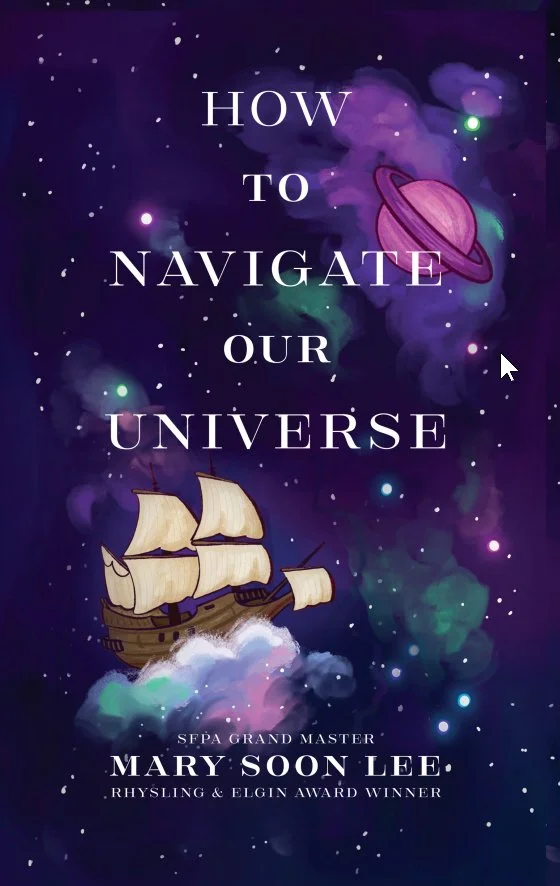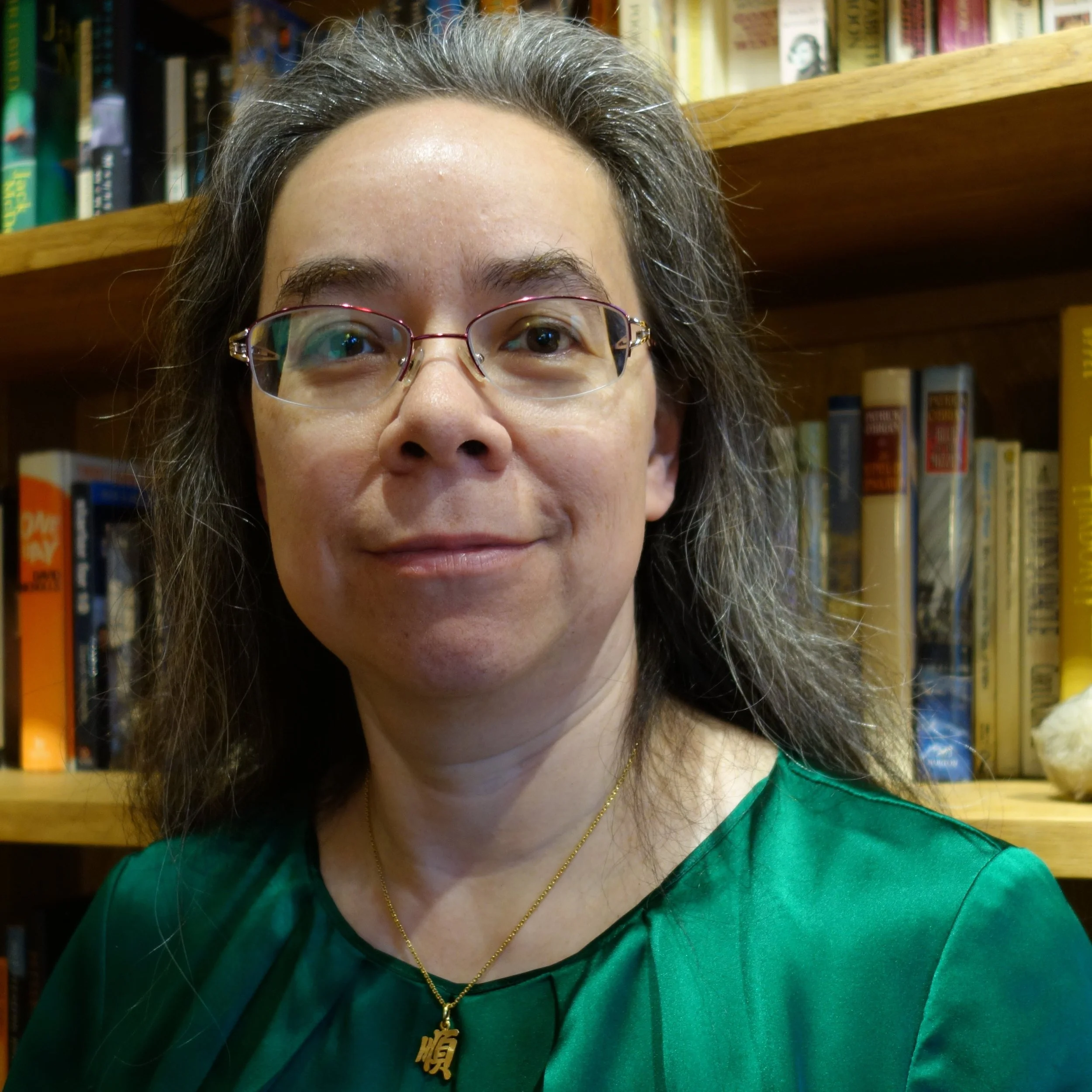This month, Sahtu Press continues our new interview series with writers across the globe to assist intercultural conversations on what it means to be creating in our modern times, finding our own voices, and reaching towards the outermost limits of our imagination. This month we interview speculative poet Mary Soon Lee.
Mary Soon Lee was born and raised in London, but has lived in Pittsburgh for thirty years. She is a Grand Master of the Science Fiction & Fantasy Poetry Association and a three-time winner of both the AnLab Readers’ Award and the Rhysling Award. Her latest books are from opposite shores of the poetry ocean: “How to Navigate Our Universe,” containing 128 astronomy poems, and “The Sign of the Dragon,” epic fantasy, winner of the Elgin Award. Her website, cryptically named, is marysoonlee.com.
Can you tell us a little about yourself, and how did you develop an interest in writing?
I was born and raised in London in a mixed-race family. My mother was Irish; my father was Malaysian-Chinese. (I later learned that his mother was Peranakan, but as a child I thought of him as purely Chinese.) I grew up as an only child and spent a lot of time on my own, but rarely lonely. I found great companionship in books. There were many days when I read an entire book, paused to take it in, then reached for the next book.
Despite loving reading, I never thought of being a writer. Instead, I studied mathematics and computer science, worked in a small AI company for a couple of years, then returned to do an M.Sc. in Astronautics and Space Engineering. Shortly after the M.Sc., I moved to Boston, USA, where the Gulf War led to a delay in my work permit being issued. While I waited, I wrote. I wrote and discovered how much I liked doing so. I ended up turning down a job offer I’d previously accepted in order to keep writing.
What are some of your favorite things to study, and how has that come into your poetry?
For me, there’s often a considerable delay between the initial seeds of a project and the moment I begin writing. In high school, I had a fondness for chemistry, partly due to the excellence of my chemistry teacher, Jane Angliss. I then spent decades without studying chemistry. One day, with no grand scheme in mind, I wrote a haiku for hydrogen, the first element in the periodic table. Memories from high school stirred…. That same day, I added haiku for helium and lithium, the next two elements. Over the next few months, I worked my way, element by element, to the end of the periodic table. (The resulting project, Elemental Haiku, first appeared in Science and was reprinted as a book from Ten Speed Press.)
Similarly, I recently published a collection of 128 astronomy poems titled How to Navigate Our Universe. The furthest origins of that collection lie in my father teaching me the names of the planets when I was small, and impressing upon me that this was Very Important Information. This led me toward a lifelong interest in space, although the only time I studied space formally was during my M.Sc.

Who do you turn to for your literary inspirations?
Inspiration can be unexpected and indirect. For instance, one day in 2013, I sat down and wrote a poem about a sixteen-year-old prince being chosen by a dragon to be king. I’d meant it to be a standalone poem, but the boy stayed with me. I gave him a name, Xau, and wrote poem after poem about him. This produced, over the course of three years, my epic fantasy The Sign of the Dragon, the length of a novel but told in over three hundred poems. Part of the credit for this goes to Aurora Leigh by Elizabeth Barrett Browning, which I’d read when I was young. Aurora Leigh is a novel-length narrative verse written in English, something I hadn’t realized was even a possibility before I read it. I’d read ancient verse classics from Greek and Latin, but Aurora Leigh was a 19th-century English work.
Indirectly, everything I’ve read feeds into what I write, especially all the authors I’ve loved enough to read and re-read. J.R.R. Tolkien. Ursula K. Le Guin. Jane Austen. Molly Gloss. And on, and on, and on.
I have also repeatedly found inspiration in The Daily Poet, a book of poetry prompts by Kelli Russell Agodon and Martha Silano. One of their prompts led me to write several quirky how-to poems, including this very short poem:
How to Be a Star (first published in Uppagus)
Gravitationally collapse a nebula.
Fuse hydrogen into helium.
If desired, explode.
“How to Be a Star” in turn led me to write the aforementioned astronomy collection, How to Navigate Our Universe, which is mostly made up of how-to astronomy poems, by turns whimsical, serious, humorous.
Beginning in 2017, I made a deliberate effort to read more Asian classics: The Journey to the West, Water Margin, Romance of the Three Kingdoms. And poetry: Basho, Li Bai, Du Fu, et al. This has undoubtedly influenced some of my more recent work. I’d read The Tale of Genji as a child, but was otherwise woefully ignorant. N.B. I read these classics in translation. Unfortunately, I neither speak nor read Chinese or Japanese.
And sometimes the inspiration is clear and direct. E.g., this year I wrote nine poems inspired by Ted Kooser’s poem “So This is Nebraska.”
What has it been like being a speculative poetry writer in Pennsylvania? How do you find a sense of community?
When I moved to Pittsburgh in 1993, I was a writer of short stories rather than poetry. I’d belonged to a speculative-fiction workshop in Boston and decided to start one in Pittsburgh. Aided by a local speculative fiction organization (Parsec), I found other Pittsburgh speculative-fiction authors. We met regularly at my house for years. I gained friendship, community, and very helpful feedback! One of the other authors, Timons Esaias, wrote poetry as well as fiction. It was due to his example that I ventured into poetry. There’s a very active poetry community in Pittsburgh, though it is largely mainstream poetry, not speculative poetry.
I’m not quite sure why, but five years ago, I mostly stopped attending in-person poetry events. This was pre-pandemic. Then, during the pandemic, Timons Esaias invited me to join communal writing sessions over Zoom. Of late, this has been my writing community. Four mornings a week, I sign into the Zoom session with a bunch of other authors. We chat a little, share our writing goals for the morning, then write separately but communally. It’s been very helpful to me.
What’s the best compliment you’ve received for your writing so far?
Every time a reader mentions they enjoyed my work, it is a joy to me. I have a large artwork titled The Elephant in the Room on my kitchen wall, which Victoria Brogdon created after being inspired by my haiku for uranium. That was a great compliment. And I’ve won the AnLab Award for best speculative poem three times, voted on by the readers of Analog. That also made me very happy. I mentioned The Sign of the Dragon, my epic-fantasy-told-in-poems in an earlier answer. Of all the things I’ve written, it’s the one that matters most to me. So any positive comments about that book are especially precious to me.
What’s one of the most unusual subjects you’ve taken on with your writing?
Hmmm. Most of my writing is short-form, either standalone short stories or standalone poems. Those cover a multitude of subjects but are brief. Of my few longer projects, The Sign of the Dragon has some unusual aspects. Firstly, it’s an epic fantasy that is told in narrative poems. Secondly, my imaginary hero, King Xau, rules a kingdom that draws on Chinese influences, while his first enemy, King Donal, rules a kingdom with Celtic overtones. That atypical combination undoubtedly arose — unplanned — from my own mixed heritage. Thirdly, King Xau is an unusually virtuous hero. He’s not notably handsome, nor a master warrior, nor exceptionally intelligent. But at almost every turn, he does what he believes is right, no matter the cost to him. (My family kept telling me that Xau was too perfect.)

What advice would you have for emerging poets to inspire them to keep writing?
Be persistent. Don’t give up on writing after receiving a rejection. And don’t stop writing after a handful of poems. Poetry can be squeezed into small spaces. The year after my second child was born, I wrote only eleven poems and two short stories, fitting them into small patches of free time. If you are able to write a poem a week, that adds up to over a hundred poems at the end of two years. I also advise writers, emerging or vintage, to read widely.
What’s next for you?
I’m not certain! I have a number of ongoing poetry sequences that I’m slowly adding to, but I’m not sure whether any of those will end up being book-length. Meanwhile, my most recently completed substantial project is with my agent. It’s a poetry sequence — mostly not speculative — about having breast cancer. (I was diagnosed with breast cancer in August 2022 and recently completed treatment.)
Thank you very much for your thoughtful questions!

